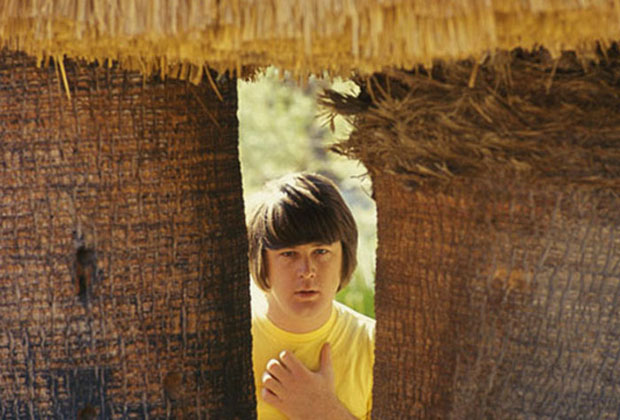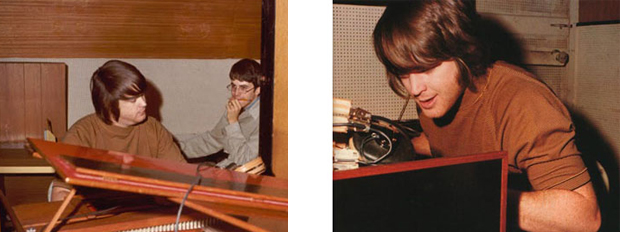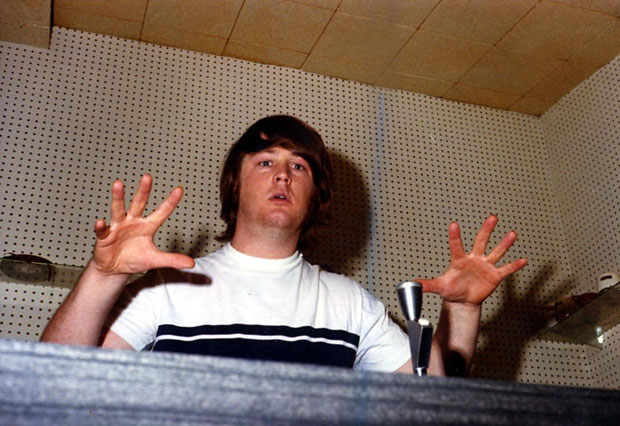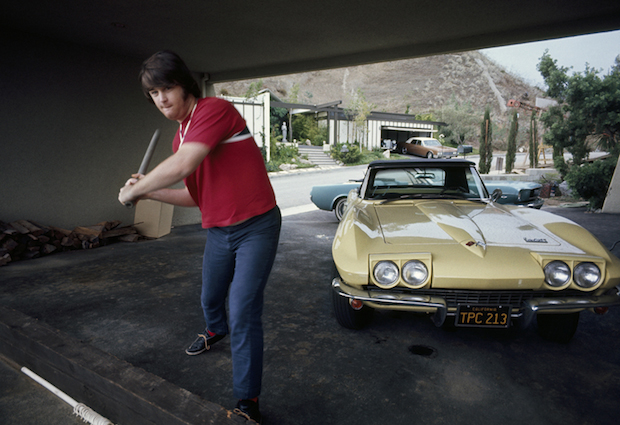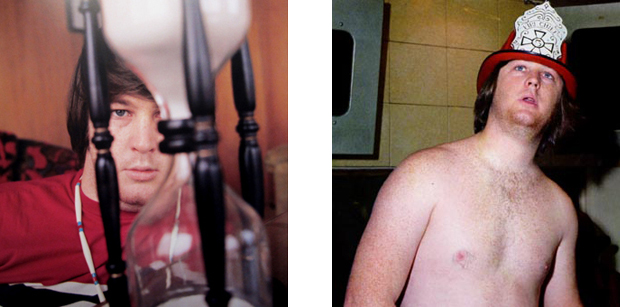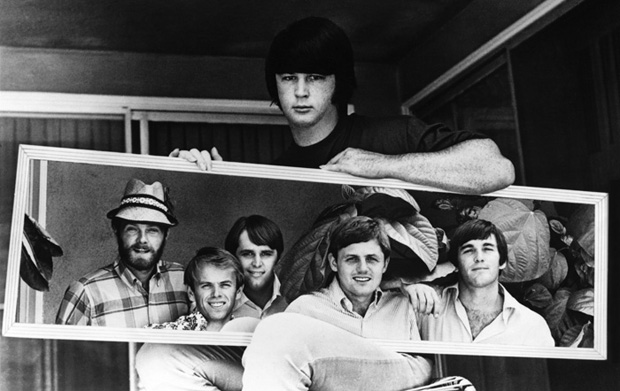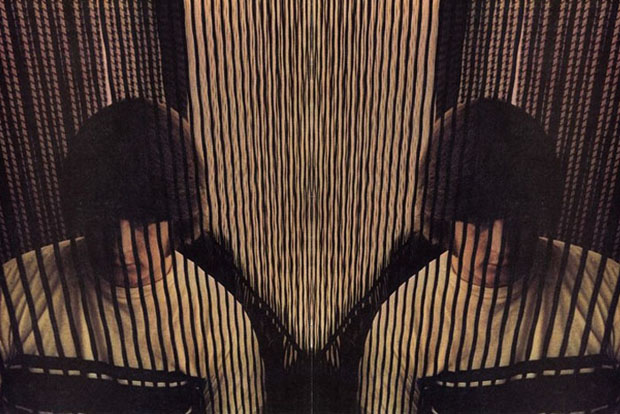
|
|
|
It's very difficult to sit down and write about The Beach Boys' SMiLE album, because so much has already been written, and yet I find myself compelled to do so. Regarded as the most infamous unreleased album of all time, the SMiLE Sessions finally have their first official release in the form of a beautiful box set. Before I get into the concept of SMiLE, it's important to understand that a completed SMiLE album does not exist, nor has it ever existed. The music that comprises SMiLE is unfinished and stored somewhere in Brian Wilson's imagination. When I met David Leaf (Brian's manager and foremost Beach Boys expert) at the premiere of Beautiful Dreamer in London in 2005 he insisted that Brian never envisaged SMiLE as an album, he was just making music and couldn't be constrained by the notion of fitting music onto an album. What we have here is the music that Brian Wilson made in 1966 and 1967, some of it finished and some unfinished. Completed or not, the music on this set is, in my opinion, the most ambitious rock music ever comitted to tape. I've been aware of most of the music on this set for a good fifteen years and like most Beach Boys obsessives have collected all the various bootlegs that have been released over the years, indulging in the richness of the music and trying to make sense of Brian's original vision. Some of the music recorded during the SMiLE sessions ended up appearing on The Beach Boys albums Smiley Smile and 20/20 in a somewhat watered-down form. Other snippets appeared on the 1993 Good Vibrations box set. Obviously, everyone is aware of "Good Vibrations" but whether it would have actually appeared on a finished version of SMiLE is open to debate. The drawn-out process of recording the song was actually started during the sessions for Pet Sounds. I have to admit that, growing up, I just was not aware of how progressive, and brilliant, "Good Vibrations" actually is. It's suffered from overplay on the radio to the point where it's almost impossible to hear it anymore. It is, however, Brian Wilson's first attempt at producing modular music, or a "pocket symphony" as he called it. Hearing the copious number of sessions on the box set makes you realise just how incredible a piece of work it is. Recorded over many months at various studios with numerous musicians, sometimes hired just to complete the recording of one bar of music, it's a perfect example of Brian's radical attempt to produce experimental, fragmentary music and is a pre-cursor of the SMiLE album. Brian was never the most stable of people; he quit touring with The Beach Boys after suffering anxiety attacks in 1964. The work that was completed on "Good Vibrations" is all the evidence we need of where Brian was headed artistically and emotionally. This new modular approach to making music can either be seen as a work of genius or completely schizophrenic and was probably not helped by Brian's combined use of the downer Seconal and the methamphetamine Desbutal throughout the recording process. Having worked with Tony Asher on Pet Sounds, Brian was on the lookout for a collaborator for the SMiLE project, which at the time he began to call a "Teenage Symphony to God". Brian's original concept for SMiLE was to produce an album, in the form of three suites, that would work as a musical journey across America from east to west, beginning at Plymouth Rock and ending in Hawaii. The album would reflect the impact of white settlers on Native Americans, the influence of the Wild West and freedom of the country opened up by railroad and motorway--a long way from "Be True To Your School". In order to achieve this vision, Brian turned to Van Dyke Parks, a writer and lyricist with a keen interest in Americana and Manifest Destiny, who had previously worked with The Byrds. Van Dyke Parks was a great esoteric and the perfect person to help Brian fulfill his artistic vision for SMiLE. Brian had been reading about Native American cultures and their respect for nature and wanted Van Dyke to interpret his ideas into lyrics for the SMiLE project. The rejuvenating freedom of the Sixties is evident in the birth of SMiLE. Brian was convinced that laughter is the best form of medicine (hence the title of the album), and, despite the somewhat heavy themes behind the record, many of the lyrics are throwaway or of-the-moment. Brian's whole being around this time seemed to be a reaction to non-judgmentalism or straight thinking and was probably influenced by his use of LSD during the previous year. He believed that music is God's voice and wanted to create spiritual music, or "music to pray to", as he told Andrew Loog Oldham. SMiLE would be an album of hopeful, fun, love-advocationg songs that would transcend all musical and artistic boundaries. Brian was obsessed with 'the moment', what Ian MacDonald might call a "Post-Christian nowness", and was frustrated by having to book recording studios in advance, or to hire musicians. Friends were called at 4 a.m. to come over to the house to listen to acetate cuts of the evening's recordings, and dinner party guests were ordered to play rhythms on glasses and tableware. The whole notion of SMiLE was one of spontaneity, and in 1967 there were no limits to Brian's imagination! There are literally hundreds of stories about Brian's artistic whims during this period, the most famous of which, perhaps, is the grand piano in a sand box that he had installed in his house in order to write SMiLE with Van Dyke Parks. These artistic whims could be seen by many as indulgent, eccentric, or even insane. To others they can be viewed as an artist at the peak of his powers creating the perfect environment for his creative vision. Having completed "Good Vibrations" in a fragmentary fashion, Brian went into the studio hoping to conceive SMiLE in similar style. Hearing the session outtakes on the box set, it's very easy to hear how in-control Brian is at the sessions. As always, Brian is completely sure of what he wants and communicates what he hears in his head to the assembled musicians. Unable physically to write the music down on paper, he encourages the musicians to play emotionally and from the heart. This is easier said than done, no matter how good the musicians are! Most studio musicians are happy to clock in, read music from the sheet, and get out of the studio as quickly as possible. Brian encouraged the musicians to play with feeling in order to acheive what it is he heard in his head, using keywords and setting a scene in the studio to achieve the feeling he wanted. The innumberable sections recorded for the piece "Heroes and Villains" alone boggles the mind. As with "Good Vibrations", one session might be dedicated to recording just one bar of music that would eventually be fitted into a coherent whole. Brian heard what he wanted in his head, but the possibilities with so many different sections are infinite. Considering Brian's quest for spontaneity, it's easy to see how the individual sections could become disconnected or even incoherent. Despite this, the things that were actually commited to tape are about as creative as anything you're likely to hear. During the session for "Fire (Mrs. O'Leary's Cow)", inspired by the Chicago fire of 1871, Brian instructed all the musicians to wear fire helmets and lit small fires in buckets in the studio while the musicians were recording. Legend has it that this is where things began to fall apart for Brian, but upon hearing the session tape it's clear that this is far from the case! Once again Brian was in complete control and an absolute authority in the studio. The music, however, is pure avant-garde and way, way beyond anything that was happening in popular music at the time. It comes from somewhere completely left-of-field and is clearly a work of creative genius. It could also be an indicator of the paranoia that soon took its toll on Brian's psyche. A building just up the street from the studio burnt down a few days later and Brian convinced himself it was a result of the "Fire" session tapes. The music on SMiLE, whether finished or not, is as expansive as the country that inspired its themes. There's a soaring optimism to virtually all of the music that was recorded during the project. The spiritual impulse of the music is very Sixties in that respect and some of the songs, such as "Wind Chimes", perhaps sound dated as a result. Overall, I would say that the music on SMiLE does not have the same emotional weight that its predecessor Pet Sounds has, but, in terms of its musical scope it is on another level altogether. The "album" opens with "Our Prayer", a spiritual moment, setting the tone for what lies ahead. "Heroes and Villains" in its many parts takes the listener on a journey across the great plains, displaying how Manifest Destiny had its decimating effect on native American culture. It traverses the American West and the westward expansion of America, from Plymouth Rock to Hawaii by route of a bicycle rider. "I'm In Great Shape", "Barnyard", and the chugging locomotive of "Cabin Essence" deal with the robust spirit of the settlers, the rustic settlements of the pioneers, and the story of Chinese immigrant camps. The spontaneous whimsy of "Barnyard" and "Vega-Tables" are at the heart of SMiLE in many ways, a reaction to the uptight Fifties and a forging of a new spiritual awakening. The spiritual section of the record, "Wonderful", "Surf's Up", and "Child is the Father of the Man" are to me are among the most beautiful things The Beach Boys ever recorded and Brian's solo performance of "Surf's Up" is about the most engaging thing I've ever heard. The elements suite, which is comprised of "Wind Chimes", "Fire (Mrs. O'Leary's Cow)", and "Water (Love To Say Dada)", is also breathtaking in its scope. Brian Wilson, aged twenty-four in 1966, had already written, performed and produced over twenty hit albums and singles for The Beach Boys and others. In the space of five short years he progressed from "Surfin''' to "Surf's Up", a creative trajectory only matched by The Beatles in my opinion. It's a body of work that really does put contemporary bands to shame! Despite this, or possibly because of this, The Beach Boys were considered the unhippest-of-the-unhip in the mid-Sixties. In the words of Brian himself they looked "more like golf caddies than rock stars." Led by the egotistical, conservative Mike Love, the band's live performances at that time are embarrassing to me. Brian chose to stay at home, writing and creating, while the boys hit the road reinforcing their reputation as the "number one selling hot rod and surf band in America." It's remarkable to think that Brian Wilson, the leader of The Beach Boys, would stay home in California pushing the boundaries of popular music while his band treaded water. The Beach Boys were touring Britain as Brian began the writing and recording process of SMiLE. It's understandable that there would be some resentment from the members of a band, who had just conquered Britain, on their return home. While The Beatles went on an acid trip together, Brian Wilson was left on his own. There had already been resentment towards "Brian's ego music" from members of the band during the Pet Sounds sessions and the initial cuts from SMiLE, although clearly brilliant, were obviously going to leave some members of the band nonplussed. Most of the instrumental cuts had been finished by the time The Beach Boys returned to add their inimitable voices to the mix. Clearly Brian was on a whole different path to the rest of the band and hearing the resistence from the boys during the vocal sessions, included on the box set, is incredibly painful listening. It's understandable in many ways that the band would be reluctant to succumb to Brian's will after triumphantly returning home from Europe. Obviously a lot of ego was involved and being asked to "crawl around and snort like a bunch of pigs" was not a welcome distraction. The vocal parts that Brian wanted the band to perform were as complex as anything they had ever attempted and frustrations ran high. The acapella cuts on the box set highlight just how intricate and ambitious those parts were. The 'Who Ran The Iron Horse?' section of "Cabin Essence" is incredibly unconventional when heard on its own and is akin to György Ligeti's vocal works. This song in particular seemed to be a sticking point within the band and tensions ran high during the recording sessions. Not only was the music clearly difficult to perform but the cryptic nature of the lyric, "Over and over, the crow flies, uncover the cornfield. Over and over, the thresher and hover, the wheat field" became a sticking point. Mike Love took Van Dyke Parks to task over the lyric, calling it "acid alliteration" and asked Parks to explain the meaning of the words to him. Clearly, explaining his poetry to disgrunteld members of the band was not high on his list of priorities and Parks left the project at this point. Without his biggest ally at his side, Brian's sensitivity grew, as did the resistence of The Beach Boys, and the SMiLE project began to fall apart. It's impossible to pinpoint exactly when SMiLE was scrapped but it most probably happened soon after The Beach Boys returned to California and Van Dyke Parks left the project. Brian's creative heart was broken by scared band members and a record company only interested in music that stuck to the tried-and-tested formula. I'm sure that the scattered nature of sessions didn't help Brian's thinking and the countless mixing possibilities of the recorded sessions most probably became a heavy burden. There's an argument that LSD had an adverse effect on Brian's fragile sensitivity, but there is absolutely no evidence to support this on the music presented in this set. Brian's creativity was slowly beaten down until he had nothing left at all. His competitive streak also took a severe knock when The Beatles released Sgt. Pepper's Lonely Hearts Club Band in June of 1967. Had SMiLE been released in 1967 I have no doubt that it would have changed modern music in the way that Sgt. Pepper did. SMiLE was a pre-cursor to sampling and modern electronic/digital music in that it wasn't based on individual ensemble performances but rather around short fragments, or feels, of music that could later be assembled in a modular fashion. In many ways the death of SMiLE predicted the end of the Sixties dream as much as Altamont or the Manson Family murders. Over the years since its inception, SMiLE has become a multi-media project in its own right. Tapes have consistently escaped the archives over the past forty years and made their way into the hands of fans and bootleggers. It's the perfect album to remix as there is so much recorded material to work with and no finished version of the album was ever made available. The modular fashion of the music means that you can remix it ad infinitum! I "perfected" my own SMiLE mix back in 2001 which I recently updated with a few better quality recordings from the boxset. The tracklisting is as follows: 01.Our Prayer 02.Gee 03.Heroes and Villains (Bicycle Rider) 04.Wonderful 05.Home On The Range/Cabin Essence/Grand Coulee Dam 06.Do You Like Worms (Roll Plymouth Rock) 07.Barnyard 08.My Only Sunshine/The Old Master Painter 09.I Wanna Be Around 10.Good Vibrations 11.Vega-Tables 12.I'm In Great Shape 13.Holidays 14.Wind Chimes 15.Fire (Mrs. O'Leary's Cow) 16.Water (Love To Say Dada) 17.Surf's Up 18.Child Is Father Of The Man 19.Look (Song For Children) 20.You're Welcome. You can download the mix HERE Brian took to the road after the death of his brother Carl in 1998, performing with a band of Los Angeles musicians brought up on the music of The Beach Boys. Brian was probably regarded by most people as the Beach Boy most likely to die first, and yet he found himself the only surviving Wilson brother. Taking to the road to keep alive the family name, and the legacy of The Beach Boys, must have taken a tremendous amount of courage. I did meet Brian very briefly, just to say "hello" to him, before a performance of Pet Sounds in London in 2002. I'm not sure if it was the medication he was taking or just where his head was at in general but it felt like talking to someone who just wasn't there at all. It was pretty heavy on me and not a particularly pleasurable experience in all honesty. I remember writing in my journal at the time: "Just met the ghost of Brian Wilson!". I was fortunate enough to attend the first ever live performance of SMiLE at the Royal Festival Hall in London on February 20th, 2004. It was, without doubt, the most moving show that I've ever been to and one of the nights of my life. I was in the habit of recording shows on my MiniDisc player at the time, with limited degrees of success. Of course I wanted to try to record the first ever live performance of SMiLE, and something magical happened. Most of the distortion and annoying bottom end that I'd encountered on previous recordings was not there when I played the recording back and I had an almost pristine recording of the show! You can download the SMiLE portion of the show HERE I also managed to get front-row seats for the performance on the 27th and you can find some pictures from the show HERE The album Brian Wilson Presents SMiLE was released late in 2004 and although it lacks the magic of the original SMiLE sessions it is a wonderful testament to human endeavour and a fabulous listen in itself. I cannot blame Brian for wanting to banish his own demons and finish SMiLE. The legend of the unreleased SMiLE album has only increased over the past few decades. I'm glad that Brian has finished a version of the album himself and that the session tapes have now been released by Capitol. The legend is not dead. The proof is in the pudding and the music recorded for SMiLE is as brilliant as anything in modern music. |
|

